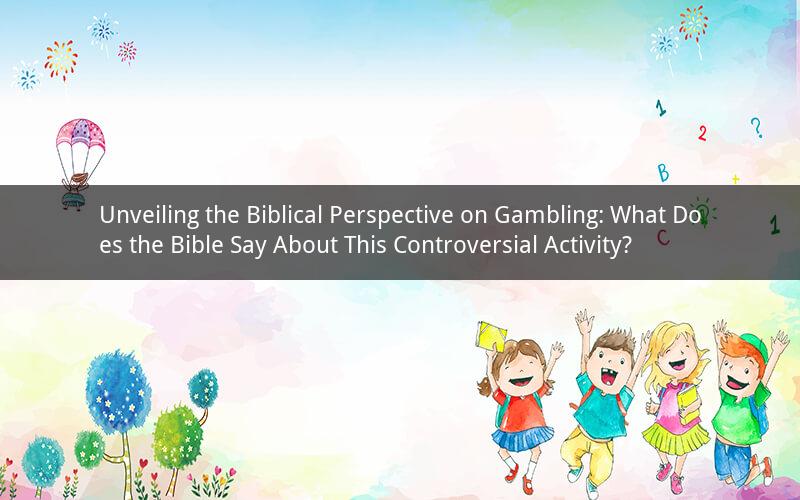
Introduction:
Gambling has been a topic of debate for centuries, with varying opinions on its moral implications. Many Christians are curious about the stance of the Bible on gambling, as it is often seen as a form of entertainment or a means to make money. In this article, we will explore the biblical perspective on gambling, focusing on what the Bible says about it being a sin.
1. What Does the Bible Say About Gambling?
The Bible does not explicitly mention gambling as a sin. However, it offers several principles and teachings that can be applied to the act of gambling. Let's delve into some key biblical verses that shed light on this topic.
a. Proverbs 13:11 - "Dishonest money dwindles away, but he who gathers money little by little makes it grow."
This verse suggests that accumulating wealth through dishonest means, such as gambling, can lead to financial instability. It emphasizes the importance of earning money through hard work and integrity.
b. Colossians 3:9 - "Do not lie to each other, since you have taken off your old self with its practices and have put on the new self, which is being renewed in knowledge in the image of its Creator."
This verse encourages believers to live honest and truthful lives. Engaging in gambling, which often involves deceit and dishonesty, may be seen as a contradiction to this biblical teaching.
c. 1 Timothy 6:10 - "For the love of money is a root of all kinds of evil. Some people, eager for money, have wandered from the faith and pierced themselves with many griefs."
This verse highlights the potential dangers of the love of money, which can lead individuals to abandon their faith and engage in harmful activities, including gambling.
2. Is Gambling Always a Sin?
While the Bible does not explicitly label gambling as a sin, it is important to consider the context and intentions behind engaging in this activity. Here are some factors to consider:
a. Motivation: If the primary motivation for gambling is to make money quickly or escape financial difficulties, it may be considered a form of greed and idolatry, which are sins according to the Bible.
b. Addiction: Gambling can lead to addiction, causing individuals to prioritize it over their faith, family, and other responsibilities. This addiction can hinder spiritual growth and lead to other moral failures.
c. Exploitation: Engaging in gambling activities that involve exploitation, such as gambling with children or vulnerable individuals, is clearly a sin according to biblical principles.
3. Alternative Perspectives on Gambling:
While many Christians view gambling as a sin, there are alternative perspectives within the Christian community:
a. Some believe that gambling can be a form of entertainment as long as it is done responsibly and does not lead to addiction or financial ruin.
b. Others argue that gambling can be a means of raising funds for charitable causes, as seen in certain biblical narratives where people contributed their wealth for the welfare of others.
4. The Importance of Wisdom and Self-Control:
Regardless of one's stance on gambling, the Bible consistently emphasizes the importance of wisdom and self-control. Here are some relevant verses:
a. Proverbs 16:32 - "He who is slow to anger is better than the mighty, and he who rules his spirit than he who captures a city."
This verse encourages believers to exercise self-control, even in the face of temptation.
b. Galatians 5:22-23 - "But the fruit of the Spirit is love, joy, peace, patience, kindness, goodness, faithfulness, gentleness, and self-control."
These verses highlight the importance of cultivating the fruit of the Spirit, including self-control, which can help believers make wise decisions regarding gambling.
5. Questions and Answers:
Q1: Is it a sin to play lottery games for fun?
A1: The Bible does not explicitly mention lottery games, but it encourages responsible behavior and self-control. If playing lottery games is done responsibly and does not lead to addiction or financial ruin, it can be considered a form of entertainment.
Q2: Can a Christian engage in online gambling?
A2: Online gambling can be addictive and potentially lead to financial and moral failures. While the Bible does not explicitly prohibit online gambling, it is important for Christians to exercise wisdom and self-control, considering the potential risks involved.
Q3: Is it a sin to win money through gambling?
A3: Winning money through gambling is not inherently a sin. However, the intention behind engaging in gambling and the consequences of winning money should be considered. If winning money leads to greed or moral failures, it may be seen as a sin.
Q4: Can a Christian own a gambling establishment?
A4: Owning a gambling establishment can be seen as promoting and enabling harmful behaviors, such as addiction and financial ruin. While the Bible does not explicitly prohibit owning a gambling establishment, it encourages believers to consider the potential harm it may cause and exercise wisdom in their business decisions.
Q5: Is it a sin to play poker with friends for non-monetary stakes?
A5: Playing poker with friends for non-monetary stakes can be considered a form of entertainment, as long as it is done responsibly and does not lead to addiction or moral failures. However, it is important to ensure that the activity remains a social gathering rather than a means of making money.
Conclusion:
The Bible does not explicitly label gambling as a sin, but it offers principles and teachings that can guide believers in making wise decisions regarding this activity. Whether engaging in gambling for entertainment or financial gain, it is crucial to exercise self-control, consider the potential risks, and prioritize moral integrity. By seeking wisdom and seeking guidance from the Holy Spirit, Christians can navigate the complexities of gambling and align their actions with biblical teachings.